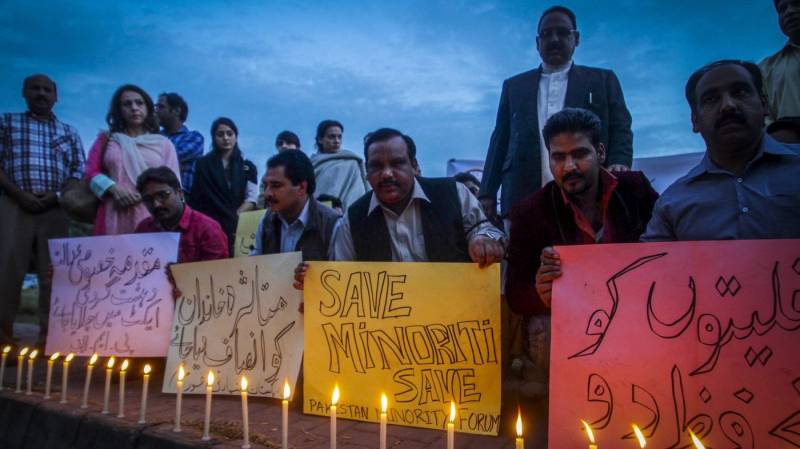
A Christian couple Shafqat Emmanuel and Shagufta Kausar who were convicted of blasphemy in 2014 are waiting for their appeal against death sentence to be heard by the Lahore High Court (LHC). The couple was sentenced to death under Section 295 –C of the Pakistan Penal Code (PPC) with Section 34 of the PPC by a Toba Tek Singh additional sessions judge five years ago.
On February 7, the appeal was fixed before the LHC division bench led by Justice Aalia Neelum, but it was left over.
Shagufta Kausar is the second woman after Aasia Bibi to be sentenced to death for blasphemy. Her husband Shafqat Emmanuel, who was convicted along with her, is disabled and cannot walk on his legs.
BACKGROUND
Muhammad Hussain, a resident of Gojra, filed a petition saying that on July 18, 2013, when he was offering Taraveeh prayers at a mosque, he received a text message containing blasphemous remarks. He then approached his lawyer to initiate legal proceedings and a case was registered.
According to police, both the convicts confessed to committing blasphemy. But legal analysts are of the opinion that a confession in such cases is almost always forced as there is absence of fairness in blasphemy-related cases.
It is pertinent to mention that Gojra district has a history of anti-minority violence. In 2009, a series of attacks targeted the Christian community in Gojra town over charges of blasphemy. Eight Christians including four women and a child lost their lives in the riots.
FORCED CONFESSION
“The convicts did not get a fair trial. The confession holds no legal value,” says Saiful Malook, the lawyer who successfully defended blasphemy accused Aasia Bibi and has been following the Shagufta and Shafqat blasphemy case. He says the police claims to have presented the convicts before the court at 6 PM, while the courts shut at 4 PM, adding that the police’s version is made up. Malook told Naya Daur that only Shafqat’s confession was obtained, and Shagufta Masih did not make any confession, contrary to what the police has stated before the court.
The couple was convicted and sentenced to death by the trial court. Saiful Malook says he would defend the convicts before the LHC because such allegations are almost always based on hearsay and the law is misused to settle personal scores and target minorities.
ACT OF VENGEANCE
According to the couple, the registration of case by their neighbors is as an act of vengeance. A few days prior to the complaint, a dispute took place between the convicts’ children and their neighbors.
Shagufta was employed at the Bishop Compound and the copy of her National Identity Card was available in the record of the Bishop Compound. The said neighbor was also working there and he managed to obtain the copy of her NIC and bought the SIM in her name and later misused it to forward the blasphemous text message to the complainant, who is an accomplice of the said neighbor.
Another aspect that raises doubts over the trial is the fact that the convicts are illiterate, while the blasphemous text message was written using English alphabets.
Saiful Malook is hopeful that he would be able to get the couple acquitted because the trial is unfair. The Aasia Bibi verdict had set an important precedent, and it is hoped that the court will do the right thing and set the couple free, he says.
